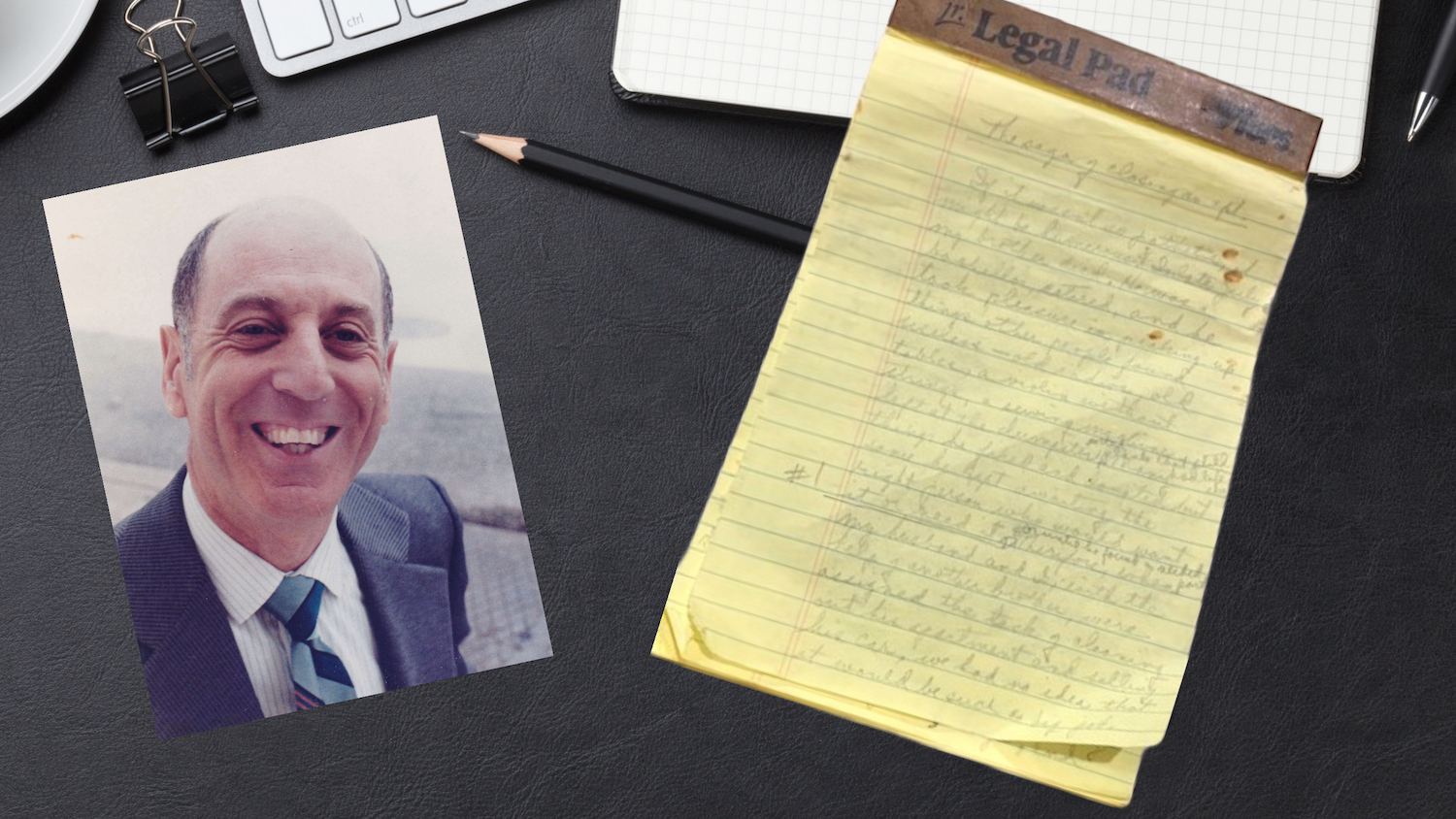The Saga of Closing an Apartment
Introduction
In 1992, my Uncle Ira wrote to my cousin David and me, asking if we would consent to be the executors of his estate. He was working with a lawyer in his hometown of Kansas City, Missouri, to get his affairs in order. David and I were the youngest niece and nephew. Statistically, we would outlive our siblings. Therefore, Ira was advised to ask us to be the executors. I should mention that David lives in Phoenix and I live in Baltimore, but we both agreed.
Three years later, in July 1995, we heard from Ira’s best friend, Bob Wayne, that Ira was in the hospital. Unbeknownst to anyone in the family, he had been diagnosed with a blood cancer three years earlier. Shortly after Bob’s phone call, Ira died. There was no funeral per Ira’s wishes.
Shortly thereafter, David, my husband and I flew to Kansas City. We met with a lawyer (not the one who made up the trust—that’s another story) and Ira’s CPA, Larry Lacey, to consolidate Ira’s assets and distribute his estate according to his wishes. We were there three days and did not have time for a thorough clean-out of the apartment.
In August, my Uncle George and my parents drove to Kansas City to close the apartment. Uncle George drove from western Illinois, my parents from Baltimore.
Below is a story my mother wrote about their experience. It was written in longhand on a small, lined pad of paper. I kept the pad because following her death in 1999, I wanted to keep a sample of her beautiful handwriting. It was a connection to her and more precious to me than any object she might have owned.
I never took the time to read the story until last night, November 7, 2022. Then, I came to the last page, or maybe the last two pages. They were missing! It was obvious that at least one page had been torn out. I questioned myself: did I tear it out years ago, unintentionally? Or, did Mom tear it out because she needed a piece of scrap paper for a list or a phone message? What happened at the end of the story?
Fortunately, David thinks he knows how the story might have ended. Thank goodness one of us remembers what happened on that trip so many years ago when we transferred ownership of stock certificates, closed out bank accounts, raided the safe deposit box, signed numerous documents and cleaned out Ira’s fridge, to name a few things.
Here is Mom’s story.
(Written in the summer of 1995, perhaps.)
It if wasn’t so pathetic, it might be humorous. In late July, my brother Ira died. He was a bachelor, retired and he took pleasure in picking up things other people found useless—old radios, old tables, a violin without strings, a sewing machine left at the dumpster, assorted plants that still had life, etc. Many things he fixed and donated but some he kept, waiting for the right person who would want or need it or until he found a needed part.
Therefore, when my husband and I, with the help of another brother, were assigned the task of cleaning out his apartment and selling his car, we had no idea that it would be such a big job.
But this is where the “fun” began. Since the three of us were from out of town, our time to do these tasks was limited. After all, we only had to call a charitable organization and they would be delighted to get the furniture, clothes, knickknacks, TV, microwave and all the other accumulations of a lifetime. Right? Wrong!
Calls were placed to the Salvation Army, Goodwill, Hadassah and two other local charities. No pick-ups in the area (Kansas City, Missouri) for six to eight weeks! Next, came the Hadassah Bargain Center. They didn’t pick up anything and they had too much clothing in their store. They weren’t interested in the apparel. My brother was a salesman for years, and all his suits, sweaters, shirts, ties and shoes were the best.
We tried several other charities. Some didn’t pick up from apartments. Some wouldn’t come into the residence at all—everything had to be put outside. All three of us are advanced seniors, so that wouldn’t work. And again, other charities were too busy for weeks and weeks to come pick up.
Meanwhile, we were packing large leaf bags and large cartons of my late brother’s possessions. Besides clothing there were a closet full of linens, cupboards full of dishes, pots and pans and all the other kitchen trappings.
One of his community projects was cleaning up the park dedicated to Vietnam veterans. Among his “finds” there were numerous watches, glasses, pocketbooks, wallets, money—lots of money over the years—keys and the like. He had little boxes of these things, except for the money, which he donated to charity.
And he saved paper—not newspaper—but medical and financial records going back dozens of years. There were kitchen drawers full, old suitcases full, a hamper full. What a chore.
Finally, we had to load up the car and make six trips with the bags, boxes, TV, antenna, microwave and all else, and we personally took them to the nearest charity.
What to do with the furniture posed the next problem. A few calls to used furniture dealers resulted in requests for antiques only. One or two pieces may have been old, but most of the items were run-of-the-mill. Finally, we got a favorable response, and they promised to purchase everything on a Friday, arrival time between 11 a.m. and 11:30 a.m.
The time came and went, and no dealer; we were biting our fingernails to the quick. A call to their office at 11:45 a.m. assured us they would arrive in a half hour. Twelve fifteen p.m. came and went and no dealer. At 12:45 we had resigned ourselves to the fact that he wasn’t coming, but at that moment, a truck pulled up with the tardy buyer.
The young man looked over the pieces for sale and gave us a pretty fair offer. However, he couldn’t use the sofa or recliner chair, the two biggest pieces. Their condition was very poor, and he had no way to repair them. We couldn’t just leave them in the apartment, so we pleaded and begged and maybe shed a tear or two. He finally agreed to take them and drop them off at a charity that does repair work. We could have kissed him.
Next came selling the car. The accountant and lawyer for the estate said that all the necessary papers were ready. My husband and brother George picked them up. Off they went to a car dealer, who, after a bit of bargaining and cajoling, came up with a fair offer. All that was left was the paperwork.
This is where Mom’s story ends, where the next page is ripped from the pad. Given the theme of what was written, I suspect that the trio experienced a snafu of sorts when trying to sell the car. This is what might have happened, according to David.
When David, Ken and I were in Kansas City, Ira’s attorney advised us that the car and a modest dollars-worth of U.S. Savings Bonds were not listed in the trust. Those items needed to go through probate. We gave her the green light to initiate that process. Probate dragged on for a very long time. Mom, Dad and Uncle George, even with a clear title, couldn’t sell the car the summer after Ira’s death. Several months later, the car was sold, uneventfully as David recalls, with the proceeds distributed to the beneficiaries.
What was supposed to be a “routine” and uncomplicated disassembling of my uncle’s possessions turned into a “chore” for his sister, brother and brother-in-law.
Please leave your comments below.
Read more by guest bloggers.


Eileen, I really love this. The fact that your mom wrote it, and you still have it is really special.
George is gone. Ira is gone. Dad and Mom gone. Sad thought overwhelm me sometimes.